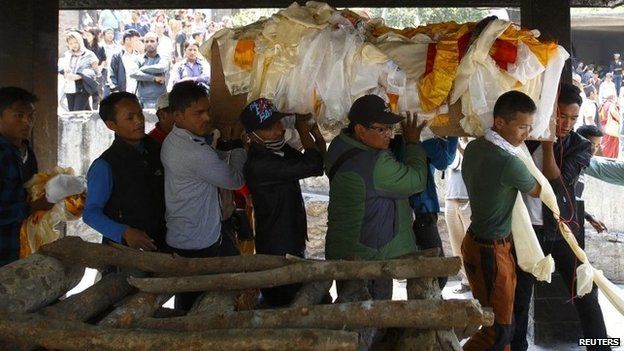Everest avalanche: Sherpas discuss boycott
- Published

Sherpa guides in Nepal are meeting climbers at Everest base camp to decide whether to cancel ascents after an avalanche on Friday killed 16 sherpas.
The sherpas have threatened a boycott unless they get a bigger share of revenue from foreign climbers.
On Tuesday the government raised the amount of compensation it is offering to the families of those who died.
Friday's was the single deadliest accident in modern mountaineering on the world's highest peak.
The avalanche struck in an area just above Everest base camp at 5,800m (19,000ft).
Mark of respect
The sherpas also want better measures to ensure speedy rescue and treatment facilities for guides.
Three commercial guiding companies, among them one from the UK, have announced they are cancelling their expeditions to Everest.
One of the guides who died was working for UK-based Jagged Globe and another five of its sherpa staff were injured in the avalanche, according to a company spokesman.
Some sherpas want the boycott as a mark of respect for their dead colleagues.
Correspondents say there is still hope a deal can be reached because so much money is at stake.
Nepalese officials and mountaineering operators are being sent to base camp to take part in the negotiations on Thursday, the tourism ministry says.
Crisis talks have also been taking place in Kathmandu between tourism officials, sherpa representatives and expedition leaders.
Sherpas can earn up to $8,000 (£4,800) in the three-month Everest climbing season, more than 10 times the average wage in Nepal, which remains one of Asia's poorest nations.
But BBC South Asia correspondent Andrew North says that does not look so good when the government is earning millions of dollars each year in fees for climbing permits and some guiding companies charging clients up to $60,000 (£36,000) per person, with more than 300 paying mountaineers this year.
The guides who lost their lives on Friday had climbed up the slope early in the morning to fix ropes for climbers and prepare the route.
The avalanche struck a passage called the Khumbu Icefall, which is riddled with crevasses and ice boulders that can break free without warning.
Although relatively low on the mountain, it is one of its most dangerous points - but there are no safer paths along the famous South Col route first scaled by Sir Edmund Hillary and Tenzing Norgay in 1953.
Sherpas often make 20-25 round trips to carry kit and supplies to advanced camps, exposing them to greater risk.
Everest has been scaled by more than 3,000 climbers since 1953.
The rising number of tourists has raised concerns about safety and environmental damage, although Nepal still plans to cut fees from next year for those wishing to make the climb.
Some 250 climbers have died on the mountain, which is on the border between Nepal and the Chinese region of Tibet, and can be climbed from both sides.
- Published14 February 2014
- Published18 April 2014
- Published18 April 2014
- Published3 March 2014
- Published21 February 2014
- Published29 April 2013
- Published2 August 2013